罗伯特·巴罗《宏观经济学:现代观点》CH08
巴罗《宏观经济学:现代观点》学习辅导书(政府支出)【圣才出品】

第12章政府支出12.1 复习笔记考点一:政府预算约束★★★1.政府支出政府支出是指各级政府购买商品和服务、转移支付(转移支付给家庭和厂商的金额)和利息支出所付出的货币。
政府支出主要用于采购商品和服务,分为中央政府采购和地方政府采购。
2.政府预算约束的定义政府预算约束是指政府资金使用总量所受到的限制。
一般而言,政府的资金使用总量必须等于资金来源总量。
其中,政府资金主要用于购买商品和服务以及转移支付;资金来源为税收和货币创造的收入。
因此,简单的政府预算约束用方程式可以表示为:G t+V t=T t+(M t-M t-1)/P t实际采购+实际转移支付=实际税收+货币创造的实际收入其中,G t表示实际采购支出;V t表示实际转移支付;T t表示实际税收;(M t-M t-1)/P t表示货币创造的实际收入。
该式表明,政府资金使用总量等于政府资金来源总量。
通常情况下,政府印制货币的实际收入占政府总收入的很小部分,因此在模型分析中常将此忽略不计,从而政府的预算约束可以简化为:G t+V t=T t上式表明,政府的实际采购支出与实际转移支付之和等于政府的实际税收收入。
3.公共生产与公共服务通常情况下不考虑公共生产,实际上是假设政府将其所有生产分包给了私人部门,政府向私人生产者购买最终商品和服务。
公共服务包括为家庭带来效用的服务和对私人生产的投入等。
考点二:家庭预算约束(见表12-1)★★★★表12-1 家庭预算约束考点三:政府采购的持久性变化(见表12-2)★★★★表12-2 政府采购的持久性变化考点四:政府采购的暂时性变化(见表12-3)★★★★表12-3 政府采购的暂时性变化12.2 课后习题详解一、概念题1.政府的预算约束(government’s budget constraint)答:政府预算约束是指政府资金使用总量所受到的限制。
一般而言,政府的资金使用总量必须等于资金来源总量。
其中,政府资金主要用于购买商品和服务以及转移支付;资金来源为税收和货币创造的收入。
《宏观经济学现代观点》考研巴罗版考研复习笔记

《宏观经济学现代观点》考研巴罗版考研复习笔记第一部分导论
第1章思考宏观经济学
1.1 复习笔记
考点一:宏观经济学的含义及研究内容(见表1-1)★★
表1-1 宏观经济学的含义及研究内容
考点二:宏观经济学的微观经济基础(见表1-2)★★★★
表1-2 宏观经济学的微观经济基础
考点三:经济模型与现代宏观经济学的研究方法(见表1-3)★★★
表1-3 经济模型与现代宏观经济学的研究方法
考点四:浮动价格与粘性价格★★
市场出清的隐含条件是价格能够迅速调整使得市场上供求平衡,但在现实当中,价格粘性甚至价格刚性都是存在的。
正如凯恩斯所提出的,劳动力市场通常处于非均衡的状态,因此,短期中劳动力的需求量与供给量之间总是存在着差异,工资率是粘性的,它仅作缓慢调整以便在长期中使劳动力市场出清。
近年来,一些宏观经济学家强调有些商品市场出现不均衡状态,这种分析方法称为新凯恩斯模型。
很多时候,宏观经济学家认为长期中价格或工资是充分变动的,而在短期分析当中则存在粘性。
当然,将长期增长的分析方法运用在短期分析当中将有助于理解宏观经济的短期波动。
宏观经济学家们一致认为:经济始终是在向市场出清状态接近的。
因此,不管对短期内粘性价格显著性的最终判定如何,利用市场出清模型做宏观经济分析确实是一条最佳的途径。
巴罗《宏观经济学:现代观点》笔记和课后习题(含考研真题)详解货币与经济周期Ⅰ:价格错觉模型【圣才出品
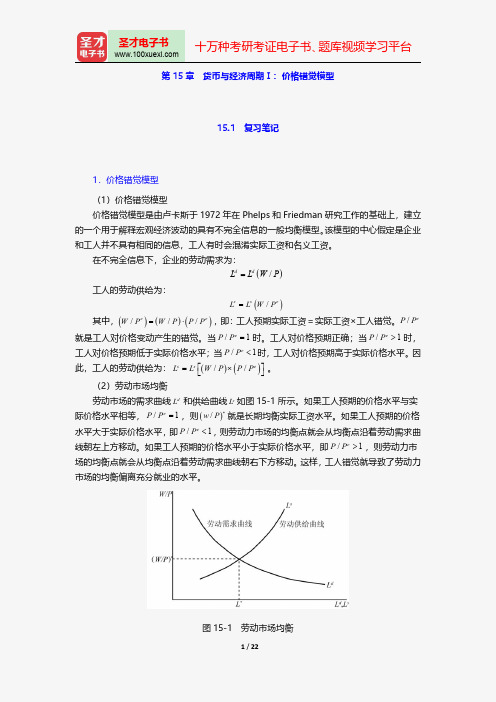
和工人并不具有相同的信息,工人有时会混淆实际工资和名义工资。
在不完全信息下,企业的劳动需求为:
Ld Ld W / P
工人的劳动供给为:
Ls Ls W / Pe
其中,W / Pe W / P P / Pe ,即:工人预期实际工资=实际工资×工人错觉。P / Pe
就是工人对价格变动产生的错觉。当 P / Pe 1 时。工人对价格预期正确;当 P / Pe 1 时, 工人对价格预期低于实际价格水平;当 P / Pe 1 时,工人对价格预期高于实际价格水平。因
企业比工人拥有更多的信息,仍按照劳动力的边际产量来雇佣工人,劳动的需求曲线保持不
变。因此,当劳动力供给曲线 LS
向右移至
LS
时,实际工资由 W
/
P *
下降到
W
/
P
'
,
劳动力的均衡就业量由 L* 提高到 L* ,产出水平也有相应提高。类似地,当价格水平低于
预期水平,劳动力供给曲线将向左移动,实际工资将要上升,而就业和产量将会下降。
此,工人的劳动供给为: Ls Ls W / P P / Pe 。
巴罗宏观经济学:现代观点第8章
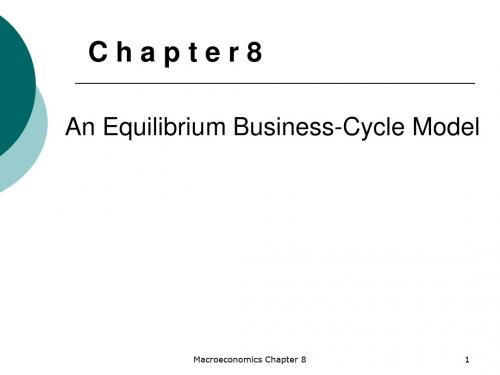
Macroeconomics Chapter 8
17
An Equilibrium Business-Cycle Model
C+ ∆K = A ·F( K, L) −δ K
depreciation, δK, is fixed in the short run,
An Equilibrium Business-Cycle Model
The Model
Marginal product of capital, real rental price, and the interest rate
An increase in the technology level, A, raises the marginal product of capital, MPK, for given inputs of capital, K, and labor, L
16
An Equilibrium Business-Cycle Model
Consumption, saving, and investment Aggregate household budget constraint
Given the markets for bonds, labor, and capital services clear:
Macroeconomics Chapter 8
13
An Equilibrium Business-Cycle Model
Macroeconomics Chapter 8
14
An Equilibrium Business-Cycle Model
Macroeconomics Chapter 8
巴罗《宏观经济学:现代观点》配套题库-章节题库-消费、储蓄和投资【圣才出品】
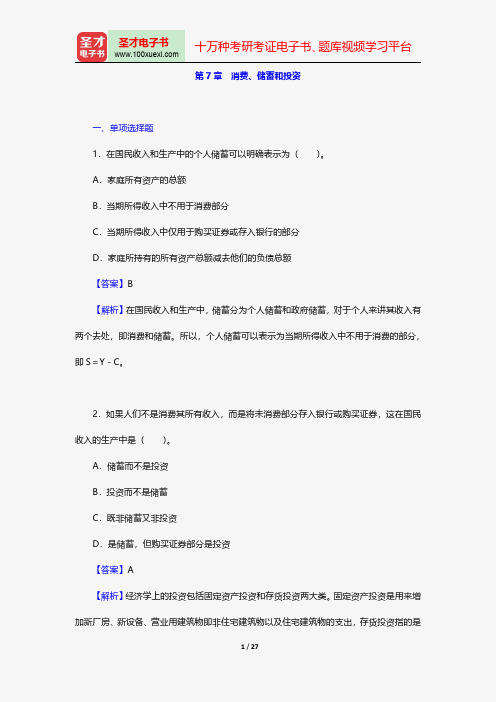
第7章消费、储蓄和投资一、单项选择题1.在国民收入和生产中的个人储蓄可以明确表示为()。
A.家庭所有资产的总额B.当期所得收入中不用于消费部分C.当期所得收入中仅用于购买证券或存入银行的部分D.家庭所持有的所有资产总额减去他们的负债总额【答案】B【解析】在国民收入和生产中,储蓄分为个人储蓄和政府储蓄,对于个人来讲其收入有两个去处,即消费和储蓄。
所以,个人储蓄可以表示为当期所得收入中不用于消费的部分,即S=Y-C。
2.如果人们不是消费其所有收入,而是将未消费部分存入银行或购买证券,这在国民收入的生产中是()。
A.储蓄而不是投资B.投资而不是储蓄C.既非储蓄又非投资D.是储蓄,但购买证券部分是投资【答案】A【解析】经济学上的投资包括固定资产投资和存货投资两大类。
固定资产投资是用来增加新厂房、新设备、营业用建筑物即非住宅建筑物以及住宅建筑物的支出,存货投资指的是企业持有的存货价值的增加(或减少)。
国民收入的生产中个人将其收入用于消费之外的部分,拿来存入银行或购买证券,是属于储蓄而不是投资。
3.实际利率与储蓄之间的关系为()。
A.实际利率上升,将导致储蓄上升B.实际利率上升,将导致储蓄下降C.实际利率上升,既可能导致储蓄上升,也可能导致储蓄下降,两者之间的关系难以确定D.实际利率上升,不会导致储蓄有任何改变,两者没有任何关系【答案】C【解析】利率通过收入效应和替代效应对消费产生影响。
收入效应是指实际利率上升将增加消费者储蓄能获得的利息收入,从而增加当前消费;替代效应是指实际利率上升将倾向于使消费者以将来的消费来替代现时的消费,亦即人们更加愿意储蓄了,从而减少当前的消费。
故只实际利率上升这一个条件,储蓄增加还是减少难以确定,要根据替代效应和收入效应的相对大小来确定。
4.企业进行存货投资的目的是()。
A.满足将来的商品需求B.批量采购可以降低成本C.平稳生产D.以上都是【答案】D【解析】企业进行存货投资的目的有:保证销售稳定、保证生产过程顺利进行、降低成本、避免脱销、在产品等。
罗伯特·巴罗《宏观经济学:现代观点》CH08
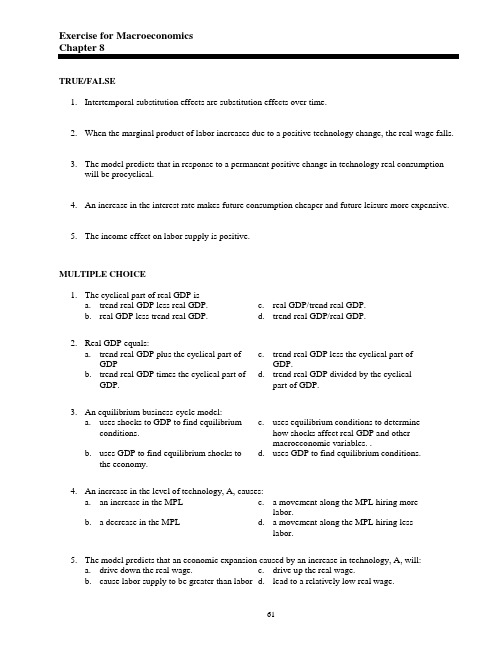
Exercise for MacroeconomicsChapter 8TRUE/FALSE1. Intertemporal substitution effects are substitution effects over time.2. When the marginal product of labor increases due to a positive technology change, the real wage falls.3. The model predicts that in response to a permanent positive change in technology real consumptionwill be procyclical.4. An increase in the interest rate makes future consumption cheaper and future leisure more expensive.5. The income effect on labor supply is positive.MULTIPLE CHOICE1. The cyclical part of real GDP isa. trend real GDP less real GDP. c. real GDP/trend real GDP.b. real GDP less trend real GDP. d. trend real GDP/real GDP.2. Real GDP equals:a. trend real GDP plus the cyclical part ofGDP c. trend real GDP less the cyclical part ofGDP.b. trend real GDP times the cyclical part ofGDP. d. trend real GDP divided by the cyclicalpart of GDP.3. An equilibrium business-cycle model:a. uses shocks to GDP to find equilibriumconditions. c. uses equilibrium conditions to determinehow shocks affect real GDP and othermacroeconomic variables. .b. uses GDP to find equilibrium shocks tothe economy.d. uses GDP to find equilibrium conditions.4. An increase in the level of technology, A, causes:a. an increase in the MPL c. a movement along the MPL hiring morelabor.b. a decrease in the MPL d. a movement along the MPL hiring lesslabor.5. The model predicts that an economic expansion caused by an increase in technology, A, will:a. drive down the real wage. c. drive up the real wage.b. cause labor supply to be greater than labor d. lead to a relatively low real wage.demand.6. The model predicts that in a recession caused by an decrease in technology, A, we would observe:a. a relatively low real wage. c. a relatively high real wage.b. an excess demand for labor. d. an increase in the MPL7. If technology, A, increases, then:a. the MPK and the demand for capitalservices increase. c. the MPK increases and the demand forcapital services decreases.b. the MPK and the demand for capitalservices decrease. d. the MPK decreases and the demand forcapital services increases.8. The model predicts that if there is a technology, A, shock, the real rental price of capital will:a. be relatively high during an economicexpansion or a recession. c. be relatively high during an economicexpansion and relatively low during arecession.b. be relatively low during an economicexpansion or a recession. d. be relatively low during an economicexpansion and relatively high during a recession.9. The model predicts that if there is a technology, A, shock, the interest rate, i, will be:a. relatively high during an economicexpansion or a recession. c. relatively high during an economicexpansion and relatively low during a recession.b. relatively low during an economicexpansion or a recession. d. relatively low during an economicexpansion and relatively high during a recession.10. During an economic expansion due to an increase in technology, A, consumption will:a. tend to rise due to the income effect. c. tend to fall due to the intertemporalsubstitution effect of the interest raterising.b. may rise or fall depending on whether theincome effect is greater than thesubstitution effect or not.d. all of the above.11. During an economic expansion due to an increase in technology, A, consumption will:a. tend to fall due to the income effect. c. tend to rise due to the intertemporalsubstitution effect of the interest raterising.b. may rise or fall depending on whether theincome effect is greater than thesubstitution effect or not.d. all of the above.12. During an economic expansion due to an increase in technology, A, consumption will:a. tend to rise due to the income effect. c. tend to rise due to the intertemporalsubstitution effect of the interest raterising.b. be unchanged. d. tend to fluctuate.13. During an economic expansion due to an increase in technology, A, consumption will:a. tend to fall due to the income effect. c. tend to fall due to the intertemporalsubstitution effect of the interest raterising.b. be unchanged. d. tend to fluctuate.14. If technology, A, increases permanently then we would expect:a. consumption to decrease as thesubstitution effect would be greater than the income effect of the change. c. consumption to increase as thesubstitution effect would be greater than the income effect of the change.b. consumption to increase as the incomeeffect would be greater than thesubstitution effect of the change. d. consumption to decrease as the incomeeffect would be greater than thesubstitution effect of the change.15. If there is a permanent increase in technology, A, then we expect consumption to:a. increase by more than real GDP. c. increase but by less than real GDP.b. increase by the same amount as real GDP. d. be unchanged.16. If there were a permanent increase in technology, A, we would expect real saving to:a. increase as the increase in realconsumption is less than real GDP. c. decrease as the increase in realconsumption is more than real GDP.b. increase as the increase in realconsumption is more than real GDP. d. decrease as the increase in realconsumption is less than real GDP.17. A variable that moves in the same direction as real GDP is known as:a. acyclical. c. countercyclical.b. procyclical. d. exogenous.18. A variable that has little tendency to move during a business cycle is known as:a. acyclical. c. countercyclical.b. procyclical. d. exogenous.19. A variable that moves in the opposite direction as real GDP is known as:a. acyclical. c. countercyclical.b. procyclical. d. exogenous.20. An acyclical variable is one that:a. moves the same direction as real GDP. c. moves the opposite direction as real GDP.b. has little tendency to move during abusiness cycle.d. determined outside the model.21. An procyclical variable is one that:a. moves the same direction as real GDP. c. moves the opposite direction as real GDP.b. has little tendency to move during abusiness cycle.d. determined outside the model.22. An countercyclical variable is one that:a. moves the same direction as real GDP. c. moves the opposite direction as real GDP.b. has little tendency to move during abusiness cycle.d. determined outside the model.23. US real consumer expenditure since 1954 has been:a. procyclical. c. a cyclical.b. countercyclical. d. exogenous.24. US real gross domestic private investment since 1954 has been:a. procyclical. c. a cyclical.b. countercyclical. d. exogenous.25. Since 1954, in the US:a. real gross private investment has variedmore than real GDP, while real consumerexpenditure has varied less than real GDP. c. real gross private investment has variedless than real GDP, while real consumer expenditure has varied more than realGDP.b. real gross private investment and realconsumer expenditure have varied more than real GDP. d. real gross private investment and realconsumer expenditure have varied less than real GDP.26. US real average earnings of production workers since 1954 has been:a. procyclical. c. a cyclical.b. countercyclical. d. exogenous.27. US real rental price of capital since 1954 has been:a. procyclical as the model predicts. c. procyclical rather countercyclical as themodel predicts.b. countercyclical as the model predicts. d. countercyclical rather procyclical as themodel predicts.28. An example of a temporary change in technology would be:a. a new discovery. c. a harvest failure.b. a new invention. d. all of the above.29. An example of a temporary change in technology would be:a. a new discovery. c. a new invention.b. a general strike. d. all of the above.30. With a temporary change in technology the model predicts:a. the interest rate will be procyclical. c. a higher interest rate will motivatehouseholds to increase current real saving.b. a lower interest rate will motivatehouseholds to increase current realconsumption.d. all of the above.31. With a temporary change in technology the model predicts:a. the interest rate will be procyclical. c. a higher interest rate will motivatehouseholds to decrease current real saving.b. a lower interest rate will motivatehouseholds to decrease current realconsumption.d. all of the above.32. With a temporary change in technology, we would expect:a. the income effect of consumption to belarger. c. the intertemporal substitution effect onconsumption to be larger.b. the income effect of consumption to besmaller. d. the intertemporal substitution effect onconsumption to be larger.33. With a temporary positive change in technology we would expect real current consumption:a. to increase a lot. c. to remain unchanged.b. to decrease a lot. d. to either increase or decrease a little.34. With a temporary change in technology, A, we expect little change in consumption because:a. the income effect on consumption islarger. c. the intertemporal-substitution effect islarger.b. the income effect on consumption issmaller. d. the intertemporal-substitution effect issmaller.35. The model predicts that an economic expansion caused by a temporary increase in technology, A,would lead to:a. high real GDP and investment. c. low real GDP and investment.b. low real GDP and high real investment. d. high real GDP and low real investment.36. Temporary changes in technology, A, conflict with the data in that:a. investment is clearly acyclical. c. the wage rate is clearly countercyclical.b. consumption is clearly procyclical. d. all of the above.37. A higher real wage:a. makes consumption more expensive. c. makes leisure less expensive.b. makes it a worse deal for households towork an extra hour.d. makes leisure more expensive.38. A higher real wage:a. increases the income of householdsinducing them to work more. c. increases the income of householdsinducing them to work less.b. decreases the income of householdsinducing them to work more. d. decreases the income of householdsinducing them to work less.39. The overall effect of a higher real wage is:a. to increase labor as the income andsubstitution effect reinforce each other. c. to decrease labor as the income andsubstitution effect reinforce each other.b. ambiguous on labor as the income andsubstitution effect work against eachother. d. ambiguous because the income andsubstitution effect reinforce each other.40. We expect that an increase in real wages will:a. increase labor supply, if temporary. c. increase labor supply, whether permanentor temporary.b. increase labor supply, if permanent. d. reduce labor supply, whether permanent ortemporary.41. An increase in the interest rate induces worker to:a. work more in the current period and lessin the future. c. work less in the current period and morein the future.b. work more in the current period and in thefuture. d. work less in the current period and in thefuture.42. A higher interest rate makes:a. future consumption cheaper. c. current consumption more expensive.b. future leisure cheaper. d. all of the above.43. A higher interest rate makes:a. future consumption and leisure moreexpensive.c. future consumption and leisure cheaper.b. future consumption cheaper and futureleisure more expensive. d. future consumption more expensive andfuture leisure cheaper.44. A higher interest rate makes:a. current consumption and leisure moreexpensive.c. current consumption and leisure cheaper.b. current consumption cheaper and current.leisure more expensive. d. current consumption more expensive andcurrent leisure cheaper.45. A higher interest rate makes:a. current consumption and future leisuremore expensive. c. current consumption and future leisurecheaper.b. current consumption cheaper and future.leisure more expensive. d. current consumption more expensive andfuture leisure cheaper.46. Intertemporal substitution effects motivate households to:a. supply more labor when the wage rate istemporarily low. c. supply less labor when the wage rate istemporarily low.b. supply more labor when the wage rate ispermanently low. d. supply more labor when the wage rate ispermanently low.47. In the US since 1964 total hours worked and employment have been:a. acyclical. c. procyclical.b. countercyclical. d. exogenous.48. The measure of labor productivity used in the popular media is:a. Y/L c. procyclical.b. average product of labor. d. all of the above.49. In the model with an upward sloping supply curve of labor and increase demand for labor due to apositive technological, A, change:a. increases employment and the real wage. c. decreases employment and the real wage.b. decreases employment and increases thereal wage. d. decreases employment and increases thereal wage.50. When the labor supply of households is allowed to slope upward:a. the model predictions match the observeddata that employment and real wages arecountercyclical. c. the model predictions do not match theobserved data that employment and real wages are procyclical.b. the model predictions do not match theobserved data that employment and real wages are countercyclical. d. the model predictions match the observeddata that employment and real wages areprocyclical.SHORT ANSWER1. If there is a positive technological change, what happens in the labor market?2. What does the model predict about investment when technology increases and why and what do thedata show about investment in the US?3. What happens to consumption when there is a permanent and temporary increase in technology, A,and why?4. What is the relationship between real GDP and the cyclical part of GDP?5. What happens in the model, if a temporary technology change increase real wages temporarily?。
巴罗宏观经济学:现代观点第10章-42页文档
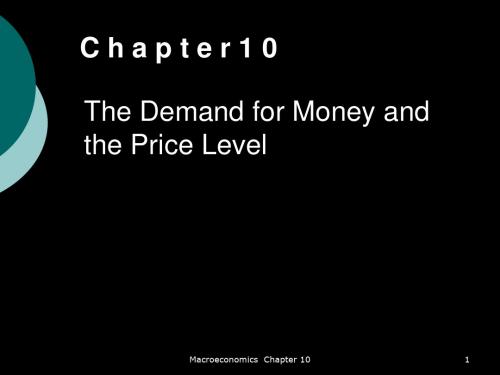
A higher interest rate, i, provides a greater incentive to hold down average holdings of money, M, in order to raise average holdings of interest-bearing assets, B + PK. That is, with a higher i, households are more willing to incur transaction costs in order to reduce M
At the Federal Reserve. Another name for high-powered money is the monetary base.
Macroeconomics Chapter 10
3
Concepts of Money
Monetary aggregate
A monetary aggregate is the total dollar stock of a group of financial assets defined to be money. The most common definition, called M1
16
The Demand for Money
The Money-Demand Function
Md = P ·L(Y, i) Md/P = L( , i)
Macroeconomics Chapter 10
17
The Demand for Money
巴罗《宏观经济学:现代观点》笔记和课后习题(含考研真题)详解运用索洛增长模型【圣才出品】

第4章运用索洛增长模型4.1复习笔记1.索洛模型中的参数变化对稳态均衡的影响(1)储蓄率的变化储蓄率s 的上升意味着当期的消费必须下降,尽管长期内会带来更高的消费水平,但这是以牺牲当期消费为代价的。
总体上说,储蓄率的上升并不必然带来福利的增加,这涉及人们对当期和未来的权衡取舍。
在考虑是否采用政策方法来改变储蓄率时,政策制定者必须决定与下一代人的福利相比这一代人的福利有多大。
如图4-1所示,两条()/s y k ⋅曲线对应储蓄率分别是1s 和2s ,2s 大于1s 。
两条s n δ+水平线也对应储蓄率1s 和2s 。
当储蓄率较高时,在k 的任何水平上每个工人有更高的资本增长率/k k ∆。
也就是说,在短期内,当储蓄率s 上升时,储蓄率的增加提高了每个工人的资本增长率;此增长率在向稳态过渡期间仍保持较高的数值。
图4-1储蓄率提高的长期影响在长期内,每个工人的资本增长率对于任何储蓄率来说都为0;在长期或稳态情况下,更高的储蓄率导致每个工人有更高的稳态资本k *,而达到稳态时的增长率仍为0。
长期内,总体的实际GDP 增大到稳态值后以稳定的速度增长,这时候增长速度等于人口增长率n ,这是因为///Y yL Y Y y y L L =⇒∆=∆+∆,稳态时/0y y ∆=,所以就有//Y Y L L n ∆=∆=。
(2)技术水平的变化在索洛模型中,技术水平提高将导致更高的稳态均衡水平。
如图4-2所示,两条曲线()()/f k s y k sA k ⋅=对应于技术水平1A 和2A ,2A 大于1A 。
当技术水平提高时,在任何k 的水平上每个工人的资本增长率/k k ∆也会提高。
在稳态情况下,/k k ∆为0,不管技术水平如何。
更高的技术水平产生每个工人更高的稳态资本,即*2k 大于*1k 。
图4-2技术水平提高的长期影响数学证明如下:人均稳态资本应满足方程:()//A f k k n s δ**⋅=+。
技术水平A 的上升并不影响方程的右边。
(NEW)巴罗《宏观经济学:现代观点》课后习题详解
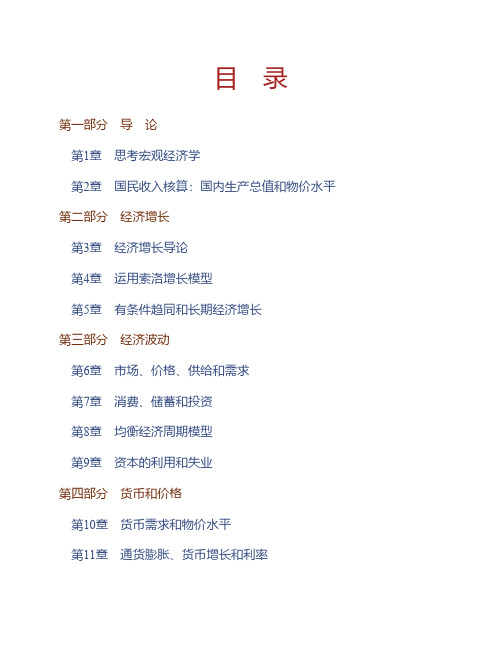
目 录第一部分 导 论第1章 思考宏观经济学第2章 国民收入核算:国内生产总值和物价水平第二部分 经济增长第3章 经济增长导论第4章 运用索洛增长模型第5章 有条件趋同和长期经济增长第三部分 经济波动第6章 市场、价格、供给和需求第7章 消费、储蓄和投资第8章 均衡经济周期模型第9章 资本的利用和失业第四部分 货币和价格第10章 货币需求和物价水平第11章 通货膨胀、货币增长和利率第五部分 政府部门第12章 政府支出第13章 税 收第14章 公共债务第六部分 货币与经济周期第15章 货币与经济周期Ⅰ:价格错觉模型第16章 货币与经济周期Ⅱ:粘性价格与名义工资率第七部分 国际宏观经济学第17章 商品和信贷的世界市场第18章 汇 率第一部分 导 论第1章 思考宏观经济学一、概念题1景气(boom)答:景气(或繁荣)是指在经济周期中,经济活动处于全面扩张,不断达到新的高峰的阶段。
一个完整的经济周期包括繁荣、衰退、萧条、复苏四个阶段。
有时也将复苏阶段和繁荣阶段合称扩张阶段。
经济学家们构建了若干指标来判断经济是否处于景气期,如采购经理人指数(PMI)等。
2经济周期(商业周期)(business cycle)答:经济周期又称经济波动或国民收入波动,指总体经济活动的扩张和收缩交替反复出现的过程。
现代经济学中关于经济周期的论述一般是指经济增长率的上升和下降的交替过程,而不是经济总量的增加和减少。
一个完整的经济周期包括繁荣、衰退、萧条、复苏(也可以称为扩张、持平、收缩)四个阶段。
在繁荣阶段,经济活动全面扩张,不断达到新的高峰。
在衰退阶段,经济短时间内保持均衡后出现紧缩的趋势。
在萧条阶段,经济出现急剧的收缩和下降,很快从活动量的最高点下降到最低点。
在复苏阶段,经济从最低点恢复并逐渐上升到先前的活动量高度,进入繁荣。
衡量经济周期处于什么阶段,主要依据国民生产总值、工业生产指数、就业和收入、价格指数、利息率等综合经济活动指标的波动。
宏观经济学:现代观点

书中对经济波动的探讨也给我留下了深刻的印象。通过对市场、价格、供给 和需求等基本概念的分析,我理解了经济波动产生的微观基础。同时,通过消费、 储蓄和投资等经济行为的深入研究,我进一步理解了经济波动对宏观经济的影响。 尤其是均衡经济周期模型的介绍,让我对经济波动的规律和特征有了更清晰的认 识。
在货币和价格部分,书中深入探讨了货币需求和物价水平的关系,以及通货 膨胀、货币增长和利率的影响。这让我对货币政策和宏观经济调控有了更深入的 理解。同时,我也明白了货币在经济中的重要地位,以及货币政策的制定和执行 对经济的影响。
内容摘要
在理论阐述的基础上,本书还深入探讨了宏观经济政策的应用和实践。这包括财政政策、货币政 策、汇率政策和国际经济政策等方面的内容。通过对这些政策工具的分析和比较,读者可以了解 政策制定者如何在实践中运用宏观经济学理论来解决经济问题,实现经济增长、物价稳定和充分 就业等宏观经济目标。 本书还了一些前沿的宏观经济问题,如经济增长、经济周期、国际贸易和金融市场等。通过对这 些问题的深入分析和讨论,读者可以了解宏观经济学在解决现实经济问题中的应用和贡献。 《宏观经济学:现代观点》是一本全面、系统、深入的宏观经济学教材。它以清晰易懂的语言和 生动的案例,帮助读者掌握宏观经济学的基本概念和原理,理解宏观经济政策的制定和实施,提 高分析和解决宏观经济问题的能力。无论是对于经济学专业的学生,还是对于对宏观经济学感兴 趣的广大读者,这本书都是一本不可多得的宝贵资源。
开放经济下的宏观经济:研究了国际贸易、资本流动对国内经济的影响,以 及开放经济下的宏观经济政策。
宏观经济学的前沿与争议:介绍了宏观经济学领域的新发展、新观点,以及 存在的争议和未解之谜,为读者提供了深入研究的线索。
系统性:目录结构清晰,层层递进,从基础知识到专题研究,为读者提供了 一条系统的学习路径。
巴罗《宏观经济学:现代观点》课后习题详解 第8章 均衡经济周期模型【圣才出品】
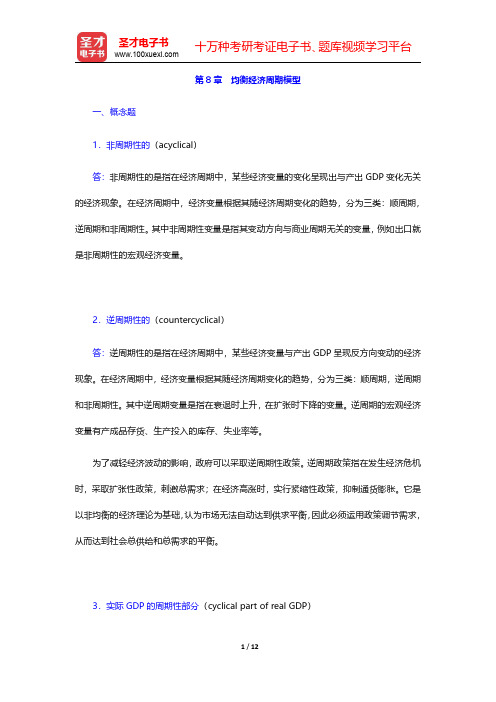
第8章均衡经济周期模型一、概念题1.非周期性的(acyclical)答:非周期性的是指在经济周期中,某些经济变量的变化呈现出与产出GDP变化无关的经济现象。
在经济周期中,经济变量根据其随经济周期变化的趋势,分为三类:顺周期,逆周期和非周期性。
其中非周期性变量是指其变动方向与商业周期无关的变量,例如出口就是非周期性的宏观经济变量。
2.逆周期性的(countercyclical)答:逆周期性的是指在经济周期中,某些经济变量与产出GDP呈现反方向变动的经济现象。
在经济周期中,经济变量根据其随经济周期变化的趋势,分为三类:顺周期,逆周期和非周期性。
其中逆周期变量是指在衰退时上升,在扩张时下降的变量。
逆周期的宏观经济变量有产成品存货、生产投入的库存、失业率等。
为了减轻经济波动的影响,政府可以采取逆周期性政策。
逆周期政策指在发生经济危机时,采取扩张性政策,刺激总需求;在经济高涨时,实行紧缩性政策,抑制通货膨胀。
它是以非均衡的经济理论为基础,认为市场无法自动达到供求平衡,因此必须运用政策调节需求,从而达到社会总供给和总需求的平衡。
3.实际GDP的周期性部分(cyclical part of real GDP)答:实际GDP的周期性部分是指实际GDP与其发展趋势之间的差异部分。
实际GDP 的周期性部分反映了经济的短期波动。
4.均衡经济周期模型(equilibrium business-cycle model)答:均衡经济周期模型是由理性预期学派主要代表人物小罗伯特·卢卡斯在1977年《对经济周期的理解》与1978年《失业政策》等中提出的一种用于解释短期经济波动的理论模型。
该理论认为经济波动取决于生产者对价格变动反应的周期理论。
5.顺周期性的(procyclical)答:顺周期性的是指在经济周期中,某些经济变量与产出GDP呈现同方向变动的经济现象。
顺周期又可以具体分为:超前、同步和滞后三种情况。
在经济周期中,经济变量根据其随经济周期变化的趋势,分为三类:顺周期、逆周期和非周期性。
巴罗宏观经济学:现代观点第8章
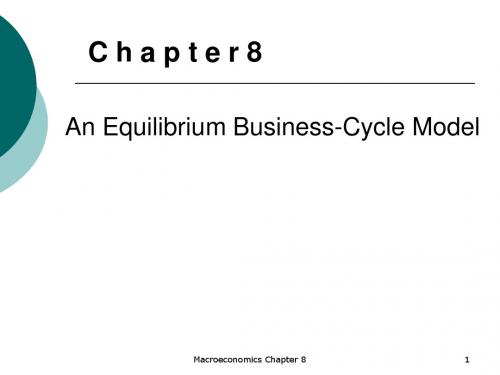
Macroeconomics Chapter 8
19
An Equilibrium Business-Cycle Model
Consumption, saving, and investment
Assume that the change in A is permanent. the increases in real income tend also to be permanent. The propensity to consume out of higher income would be close to one. When the increase in A is permanent, current consumption will rise. However, as long as the intertemporal-substitution operates at all, the increase in current consumption will be less than the increase in real GDP.
Y= A·F( K, L)
An increase in A means that the economy is more productive. A decrease in A means that the economy is less productive.
Macroeconomics Chapter 8
Macroeconomics Chapter 8
9
An Equilibrium Business-Cycle Model
The Model
Barro巴罗宏观经济学-现代观点-中文738页
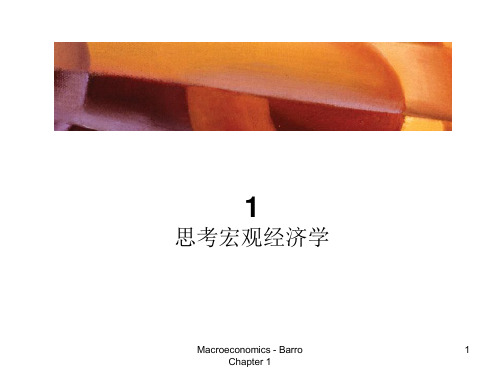
Macroeconomics - Barro Chapter 2
20
Macroeconomics - Barro Chapter 2
21
实际GDP
• 如何计算实际 GDP
– 将每年每种商品的产出数量乘以该商品在基年 的价格。 – 也被称为不变美元的GDP – 链式加权的实际GDP
Macroeconomics - Barro Chapter 2
2
国民收入核算:国内生产总值和物价水平
Macroeconomics - Barro Chapter 2
19
名义GDP
• 名义GDP 衡量的是一个经济体在某一个特 定时期(比如一年中)生产的所有商品或 服务的美元价值(或欧元价值等)。
– 名义GDP 是一个流动变量:它衡量的是每单位 时间内(比如一年)生产商品的美元金额。 – 有时候被称为现值美元的GDP。
46
每个工人的生产函数
• y=f(k)
– y 每个工人的产出 – k 每个工人的资本
Macroeconomics - Barro Chapter 3
47
图3.7 每个工人的产出和每个工人的资本
每 个 工 人 的 产 出
a点的斜率比b 点的更大
每个工人的资本
Macroeconomics - Barro Chapter 3
9
经济模型
图1.6 一个经济模型的运用
外生变量
经济模型
内生变量
Macroeconomics - Barro Chapter 1
10
经济模型
咖啡市场
图1.7 咖啡的需求曲线
需求曲线
Macroeconomics - Barro Chapter 1
巴罗宏观经济学:现代观点第8章
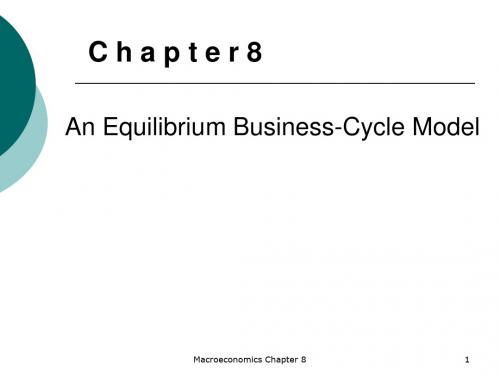
An Equilibrium Business-Cycle Model
Macroeconomics Chapter 8
1
Cyclical Behavior of Real GDP— Recessions and Booms
Real GDP = trend real GDP + cyclical part of real GDP
Macroeconomics Chapter 8
3
Cyclical Behavior of Real GDP— Recessions and Booms
Macroeconomics Chapter 8
4
Cyclical Behavior of Real GDP— Recessions and Booms
16
An Equilibrium Business-Cycle Model
Consumption, saving, and investment Aggregate household budget constraint
Given the markets for bonds, labor, and capital services clear:
The model predicts that an economic boom will have a relatively high interest rate, whereas a recession will have a relatively low interest rate.
Macroeconomics Chapter 8
Consumption and Investment
When a variable fluctuates in the same direction as real GDP that variable is procyclical.
- 1、下载文档前请自行甄别文档内容的完整性,平台不提供额外的编辑、内容补充、找答案等附加服务。
- 2、"仅部分预览"的文档,不可在线预览部分如存在完整性等问题,可反馈申请退款(可完整预览的文档不适用该条件!)。
- 3、如文档侵犯您的权益,请联系客服反馈,我们会尽快为您处理(人工客服工作时间:9:00-18:30)。
Exercise for MacroeconomicsChapter 8TRUE/FALSE1. Intertemporal substitution effects are substitution effects over time.2. When the marginal product of labor increases due to a positive technology change, the real wage falls.3. The model predicts that in response to a permanent positive change in technology real consumptionwill be procyclical.4. An increase in the interest rate makes future consumption cheaper and future leisure more expensive.5. The income effect on labor supply is positive.MULTIPLE CHOICE1. The cyclical part of real GDP isa. trend real GDP less real GDP. c. real GDP/trend real GDP.b. real GDP less trend real GDP. d. trend real GDP/real GDP.2. Real GDP equals:a. trend real GDP plus the cyclical part ofGDP c. trend real GDP less the cyclical part ofGDP.b. trend real GDP times the cyclical part ofGDP. d. trend real GDP divided by the cyclicalpart of GDP.3. An equilibrium business-cycle model:a. uses shocks to GDP to find equilibriumconditions. c. uses equilibrium conditions to determinehow shocks affect real GDP and othermacroeconomic variables. .b. uses GDP to find equilibrium shocks tothe economy.d. uses GDP to find equilibrium conditions.4. An increase in the level of technology, A, causes:a. an increase in the MPL c. a movement along the MPL hiring morelabor.b. a decrease in the MPL d. a movement along the MPL hiring lesslabor.5. The model predicts that an economic expansion caused by an increase in technology, A, will:a. drive down the real wage. c. drive up the real wage.b. cause labor supply to be greater than labor d. lead to a relatively low real wage.demand.6. The model predicts that in a recession caused by an decrease in technology, A, we would observe:a. a relatively low real wage. c. a relatively high real wage.b. an excess demand for labor. d. an increase in the MPL7. If technology, A, increases, then:a. the MPK and the demand for capitalservices increase. c. the MPK increases and the demand forcapital services decreases.b. the MPK and the demand for capitalservices decrease. d. the MPK decreases and the demand forcapital services increases.8. The model predicts that if there is a technology, A, shock, the real rental price of capital will:a. be relatively high during an economicexpansion or a recession. c. be relatively high during an economicexpansion and relatively low during arecession.b. be relatively low during an economicexpansion or a recession. d. be relatively low during an economicexpansion and relatively high during a recession.9. The model predicts that if there is a technology, A, shock, the interest rate, i, will be:a. relatively high during an economicexpansion or a recession. c. relatively high during an economicexpansion and relatively low during a recession.b. relatively low during an economicexpansion or a recession. d. relatively low during an economicexpansion and relatively high during a recession.10. During an economic expansion due to an increase in technology, A, consumption will:a. tend to rise due to the income effect. c. tend to fall due to the intertemporalsubstitution effect of the interest raterising.b. may rise or fall depending on whether theincome effect is greater than thesubstitution effect or not.d. all of the above.11. During an economic expansion due to an increase in technology, A, consumption will:a. tend to fall due to the income effect. c. tend to rise due to the intertemporalsubstitution effect of the interest raterising.b. may rise or fall depending on whether theincome effect is greater than thesubstitution effect or not.d. all of the above.12. During an economic expansion due to an increase in technology, A, consumption will:a. tend to rise due to the income effect. c. tend to rise due to the intertemporalsubstitution effect of the interest raterising.b. be unchanged. d. tend to fluctuate.13. During an economic expansion due to an increase in technology, A, consumption will:a. tend to fall due to the income effect. c. tend to fall due to the intertemporalsubstitution effect of the interest raterising.b. be unchanged. d. tend to fluctuate.14. If technology, A, increases permanently then we would expect:a. consumption to decrease as thesubstitution effect would be greater than the income effect of the change. c. consumption to increase as thesubstitution effect would be greater than the income effect of the change.b. consumption to increase as the incomeeffect would be greater than thesubstitution effect of the change. d. consumption to decrease as the incomeeffect would be greater than thesubstitution effect of the change.15. If there is a permanent increase in technology, A, then we expect consumption to:a. increase by more than real GDP. c. increase but by less than real GDP.b. increase by the same amount as real GDP. d. be unchanged.16. If there were a permanent increase in technology, A, we would expect real saving to:a. increase as the increase in realconsumption is less than real GDP. c. decrease as the increase in realconsumption is more than real GDP.b. increase as the increase in realconsumption is more than real GDP. d. decrease as the increase in realconsumption is less than real GDP.17. A variable that moves in the same direction as real GDP is known as:a. acyclical. c. countercyclical.b. procyclical. d. exogenous.18. A variable that has little tendency to move during a business cycle is known as:a. acyclical. c. countercyclical.b. procyclical. d. exogenous.19. A variable that moves in the opposite direction as real GDP is known as:a. acyclical. c. countercyclical.b. procyclical. d. exogenous.20. An acyclical variable is one that:a. moves the same direction as real GDP. c. moves the opposite direction as real GDP.b. has little tendency to move during abusiness cycle.d. determined outside the model.21. An procyclical variable is one that:a. moves the same direction as real GDP. c. moves the opposite direction as real GDP.b. has little tendency to move during abusiness cycle.d. determined outside the model.22. An countercyclical variable is one that:a. moves the same direction as real GDP. c. moves the opposite direction as real GDP.b. has little tendency to move during abusiness cycle.d. determined outside the model.23. US real consumer expenditure since 1954 has been:a. procyclical. c. a cyclical.b. countercyclical. d. exogenous.24. US real gross domestic private investment since 1954 has been:a. procyclical. c. a cyclical.b. countercyclical. d. exogenous.25. Since 1954, in the US:a. real gross private investment has variedmore than real GDP, while real consumerexpenditure has varied less than real GDP. c. real gross private investment has variedless than real GDP, while real consumer expenditure has varied more than realGDP.b. real gross private investment and realconsumer expenditure have varied more than real GDP. d. real gross private investment and realconsumer expenditure have varied less than real GDP.26. US real average earnings of production workers since 1954 has been:a. procyclical. c. a cyclical.b. countercyclical. d. exogenous.27. US real rental price of capital since 1954 has been:a. procyclical as the model predicts. c. procyclical rather countercyclical as themodel predicts.b. countercyclical as the model predicts. d. countercyclical rather procyclical as themodel predicts.28. An example of a temporary change in technology would be:a. a new discovery. c. a harvest failure.b. a new invention. d. all of the above.29. An example of a temporary change in technology would be:a. a new discovery. c. a new invention.b. a general strike. d. all of the above.30. With a temporary change in technology the model predicts:a. the interest rate will be procyclical. c. a higher interest rate will motivatehouseholds to increase current real saving.b. a lower interest rate will motivatehouseholds to increase current realconsumption.d. all of the above.31. With a temporary change in technology the model predicts:a. the interest rate will be procyclical. c. a higher interest rate will motivatehouseholds to decrease current real saving.b. a lower interest rate will motivatehouseholds to decrease current realconsumption.d. all of the above.32. With a temporary change in technology, we would expect:a. the income effect of consumption to belarger. c. the intertemporal substitution effect onconsumption to be larger.b. the income effect of consumption to besmaller. d. the intertemporal substitution effect onconsumption to be larger.33. With a temporary positive change in technology we would expect real current consumption:a. to increase a lot. c. to remain unchanged.b. to decrease a lot. d. to either increase or decrease a little.34. With a temporary change in technology, A, we expect little change in consumption because:a. the income effect on consumption islarger. c. the intertemporal-substitution effect islarger.b. the income effect on consumption issmaller. d. the intertemporal-substitution effect issmaller.35. The model predicts that an economic expansion caused by a temporary increase in technology, A,would lead to:a. high real GDP and investment. c. low real GDP and investment.b. low real GDP and high real investment. d. high real GDP and low real investment.36. Temporary changes in technology, A, conflict with the data in that:a. investment is clearly acyclical. c. the wage rate is clearly countercyclical.b. consumption is clearly procyclical. d. all of the above.37. A higher real wage:a. makes consumption more expensive. c. makes leisure less expensive.b. makes it a worse deal for households towork an extra hour.d. makes leisure more expensive.38. A higher real wage:a. increases the income of householdsinducing them to work more. c. increases the income of householdsinducing them to work less.b. decreases the income of householdsinducing them to work more. d. decreases the income of householdsinducing them to work less.39. The overall effect of a higher real wage is:a. to increase labor as the income andsubstitution effect reinforce each other. c. to decrease labor as the income andsubstitution effect reinforce each other.b. ambiguous on labor as the income andsubstitution effect work against eachother. d. ambiguous because the income andsubstitution effect reinforce each other.40. We expect that an increase in real wages will:a. increase labor supply, if temporary. c. increase labor supply, whether permanentor temporary.b. increase labor supply, if permanent. d. reduce labor supply, whether permanent ortemporary.41. An increase in the interest rate induces worker to:a. work more in the current period and lessin the future. c. work less in the current period and morein the future.b. work more in the current period and in thefuture. d. work less in the current period and in thefuture.42. A higher interest rate makes:a. future consumption cheaper. c. current consumption more expensive.b. future leisure cheaper. d. all of the above.43. A higher interest rate makes:a. future consumption and leisure moreexpensive.c. future consumption and leisure cheaper.b. future consumption cheaper and futureleisure more expensive. d. future consumption more expensive andfuture leisure cheaper.44. A higher interest rate makes:a. current consumption and leisure moreexpensive.c. current consumption and leisure cheaper.b. current consumption cheaper and current.leisure more expensive. d. current consumption more expensive andcurrent leisure cheaper.45. A higher interest rate makes:a. current consumption and future leisuremore expensive. c. current consumption and future leisurecheaper.b. current consumption cheaper and future.leisure more expensive. d. current consumption more expensive andfuture leisure cheaper.46. Intertemporal substitution effects motivate households to:a. supply more labor when the wage rate istemporarily low. c. supply less labor when the wage rate istemporarily low.b. supply more labor when the wage rate ispermanently low. d. supply more labor when the wage rate ispermanently low.47. In the US since 1964 total hours worked and employment have been:a. acyclical. c. procyclical.b. countercyclical. d. exogenous.48. The measure of labor productivity used in the popular media is:a. Y/L c. procyclical.b. average product of labor. d. all of the above.49. In the model with an upward sloping supply curve of labor and increase demand for labor due to apositive technological, A, change:a. increases employment and the real wage. c. decreases employment and the real wage.b. decreases employment and increases thereal wage. d. decreases employment and increases thereal wage.50. When the labor supply of households is allowed to slope upward:a. the model predictions match the observeddata that employment and real wages arecountercyclical. c. the model predictions do not match theobserved data that employment and real wages are procyclical.b. the model predictions do not match theobserved data that employment and real wages are countercyclical. d. the model predictions match the observeddata that employment and real wages areprocyclical.SHORT ANSWER1. If there is a positive technological change, what happens in the labor market?2. What does the model predict about investment when technology increases and why and what do thedata show about investment in the US?3. What happens to consumption when there is a permanent and temporary increase in technology, A,and why?4. What is the relationship between real GDP and the cyclical part of GDP?5. What happens in the model, if a temporary technology change increase real wages temporarily?。
